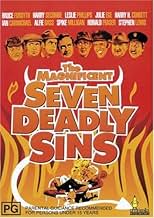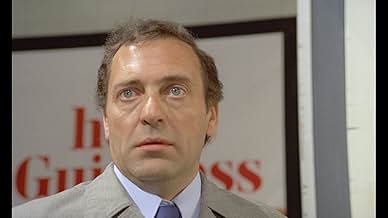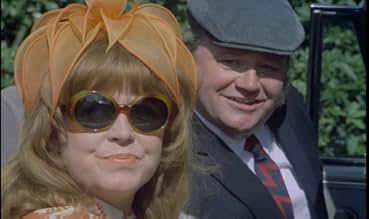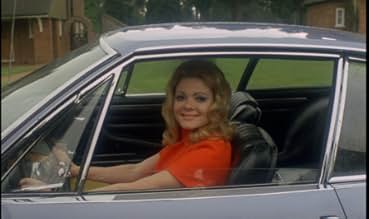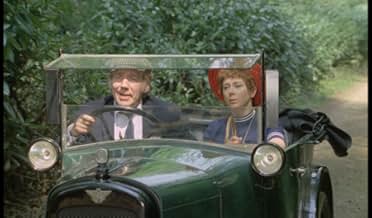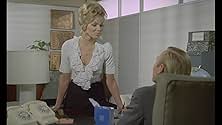Ajouter une intrigue dans votre langueThis early Seventies British comedy takes us through seven short stories based on the Seven Deadly Sins. This film is a montage of different styles, from Spike Milligan's mainly silent "Slot... Tout lireThis early Seventies British comedy takes us through seven short stories based on the Seven Deadly Sins. This film is a montage of different styles, from Spike Milligan's mainly silent "Sloth", to the leering Harry H Corbett in "Lust".This early Seventies British comedy takes us through seven short stories based on the Seven Deadly Sins. This film is a montage of different styles, from Spike Milligan's mainly silent "Sloth", to the leering Harry H Corbett in "Lust".
- Réalisation
- Scénario
- Casting principal
Suzanne Heath
- Chloe (segment "Avarice")
- (as Susanne Heath)
Rosemarie Reede
- Woman (segment "Gluttony")
- (as Rosemarie Reed)
Avis à la une
Look at the cast list of this film; try and name someone famous in late 1960s British comedy who is not there. It is not easy. This film had a huge comic talent to call on, a promising premiss, writers-a-go-go and the head-start of a fairly funny punning title. Where did they go wrong? Where did they go right?! Here is a question: into which of the 7 deadly sins would one normally put the notoriously leering Casanova Leslie Phillips? If you answered 'Gluttony' you are absolutely correct! He eats his way through a load of éclairs and has a heart attack. Spike Milligan's segment--Sloth--is probably the best overall, mainly because it is silent. However, director Graeme Stark has written quite a small masterpiece in 'Lust'--a more or less one man play with the sadly-missed Harry H Corbett. He plays the rather sad Ambrose Twombly (the fastest lighter on the Bakerloo). This is my favourite segment although it is clouded by a pathetic ending. It is worth watching this film; I think anyone would definitely enjoy it. But when it is over you will probably think, as I did, 'Why wasn't that funnier?'
Mostly pretty bland comedy, desperately contrived around its concept with an air quaint British naughtiness to keep it afloat.
I have a low key appreciation for "Pride" and "Gluttony" is sort of ribald good fun; it's fapable at the very least.
Unsurprisingly it's "Lust" that stands out among the crowd but not because it's funny or sexy. It's a disarmingly haunting depiction of loneliness and desperation.
I have a low key appreciation for "Pride" and "Gluttony" is sort of ribald good fun; it's fapable at the very least.
Unsurprisingly it's "Lust" that stands out among the crowd but not because it's funny or sexy. It's a disarmingly haunting depiction of loneliness and desperation.
Don't give up on this one after the first story or two. Wait for the segment featuring Harry H. Corbett (it's a mini-classic).
As for the rest of the episodes in the film - very hit and miss. Strangely enough, I did not find the Spike Milligan silent 'Sloth' episode funny at all. The sections with Leslie Philips and Ian Carmichael/Alfie Bass were slightly above average.
Not a complete waste of time, with one jewel amongst the rough.
Need to type three more lines of text before this capsule review will get to be submitted as at this present moment IMDb will only accept 10 lines of text minimum. Time for a change. Make it 6 or 7.
As for the rest of the episodes in the film - very hit and miss. Strangely enough, I did not find the Spike Milligan silent 'Sloth' episode funny at all. The sections with Leslie Philips and Ian Carmichael/Alfie Bass were slightly above average.
Not a complete waste of time, with one jewel amongst the rough.
Need to type three more lines of text before this capsule review will get to be submitted as at this present moment IMDb will only accept 10 lines of text minimum. Time for a change. Make it 6 or 7.
I'm a fan of Leslie Phillips, one of the all-time funniest British actors in UK history. The geniuses in Hollywood never utilized his talent, so screw them, I say. This is the second film he appeared in with the exquisite Julie Ege of Norway, a one time Hammer starlet in Creatures The World Forget. The underground segment with Harry Corbett is more noteworthy and sad than humorous.
Written by and starring a veritable who's who of '70s British comedy, one might reasonably expect The Magnificent Seven Deadly Sins to be a laugh riot from start to finish; nothing could be further from the truth. Of the seven skits on offer, five are embarrassingly unfunny and one is downright depressing. Only an absurd black-and-white spoof of silent movies succeeds in tickling the ribs, with plenty of walnut-based humour.
Being a product of the '70s, the film is unashamedly un-PC, with dolly birds in hot-pants aplenty, innuendo, and even a moment involving blackface (which is funny for all the wrong reasons). Things kick off with a tasty blonde bit of crumpet stripping off for the camera, supposedly because the girl is a friend of the director (who is presented as a horribly dated cartoon character courtesy of animator Bob Godfrey, best known for cartoon dog and cat, Roobarb and Custard). The animated film-maker then introduces the first of the seven stories...
Avarice stars TV gameshow legend Bruce Forsyth as chauffeur for a greedy businessman who demands that his driver retrieve a 50p coin that has fallen down a drain. Much of the humour is derived from Forsyth falling over in the sewer, which gives some idea of the level of sophistication at play. Didn't he do well? Well, no, actually.
The second story is even worse. Envy sees Harry Secombe as a henpecked husband ordered by his wife to buy her dream home (owned by Geoffrey Bayldon and June Whitfield), whatever it takes. The 'hilarity' includes Secombe having not one, but two, buckets of water thrown over him - it's that clever!
Up next is Gluttony, written by Barry Cryer and Graham Chapman, and starring Leslie 'Ding dong!' Phlllips as an advertising executive promoting a slimming biscuit, but who cannot help but tuck into junk food whenever he can. This is tedious stuff, only worth watching for sexy Julie Ege as vice president of the biscuit company, who, for some strange reason, has the hots for Phillips.
Number four is Lust: Harry H. Corbett plays a 38-year-old single man desperate to pull himself a bird. Rather than go to a club or pub, he hangs around a tube station and eyes up the talent, eventually settling for a girl who has been stood up by her date. While she is in a phone booth, wondering what to do, Harry pops into the next booth and rings her, chatting her up and asking if she would like to meet up. What happens next is not only not funny, but actually rather heart-rending. Corbett puts in a solid performance, but a side-splitter this is not.
Pride features Ian Carmichael and Alfie Bass as two stubborn drivers who meet halfway down a narrow country lane. With neither man willing to back up, the scene is set for laughs galore, but none arrive. What do arrive are an AA man and an RAC man, who add to the confusion, until a bobby turns up to settle the argument. Written by Galton and Simpson (Hancock's Half Hour, Steptoe and Son), but with little of their magic in evidence.
The sixth chapter is the best. A silent movie (complete with caption cards) written by and starring Spike Milligan, Sloth is sublime lunacy, featuring a cast of characters who will do anything to save themselves from effort, from a man who would rather wait for a tree to fall than walk around it, to Ronnie Barker sat down at a bus queue, asking the woman in front to help him open his walnut. This is nutty nonsense in more ways than one, and extremely funny.
It's a return to dreadful form for the final story, Wrath. Two old men on a park bench decide that they've had enough of the grouchy park keeper (played by Stephen Lewis, Blakey from On The Buses) and plot to kill him. Like a live-action Roadrunner/Wile. E. Coyote cartoon, none of their schemes go as planned, the pair eventually blowing themselves up in a public convenience (along with the park keeper, who continues to torment them in hell). It's a chuckle-free way to end what is a mostly disappointing movie, especially considering the talent involved.
Being a product of the '70s, the film is unashamedly un-PC, with dolly birds in hot-pants aplenty, innuendo, and even a moment involving blackface (which is funny for all the wrong reasons). Things kick off with a tasty blonde bit of crumpet stripping off for the camera, supposedly because the girl is a friend of the director (who is presented as a horribly dated cartoon character courtesy of animator Bob Godfrey, best known for cartoon dog and cat, Roobarb and Custard). The animated film-maker then introduces the first of the seven stories...
Avarice stars TV gameshow legend Bruce Forsyth as chauffeur for a greedy businessman who demands that his driver retrieve a 50p coin that has fallen down a drain. Much of the humour is derived from Forsyth falling over in the sewer, which gives some idea of the level of sophistication at play. Didn't he do well? Well, no, actually.
The second story is even worse. Envy sees Harry Secombe as a henpecked husband ordered by his wife to buy her dream home (owned by Geoffrey Bayldon and June Whitfield), whatever it takes. The 'hilarity' includes Secombe having not one, but two, buckets of water thrown over him - it's that clever!
Up next is Gluttony, written by Barry Cryer and Graham Chapman, and starring Leslie 'Ding dong!' Phlllips as an advertising executive promoting a slimming biscuit, but who cannot help but tuck into junk food whenever he can. This is tedious stuff, only worth watching for sexy Julie Ege as vice president of the biscuit company, who, for some strange reason, has the hots for Phillips.
Number four is Lust: Harry H. Corbett plays a 38-year-old single man desperate to pull himself a bird. Rather than go to a club or pub, he hangs around a tube station and eyes up the talent, eventually settling for a girl who has been stood up by her date. While she is in a phone booth, wondering what to do, Harry pops into the next booth and rings her, chatting her up and asking if she would like to meet up. What happens next is not only not funny, but actually rather heart-rending. Corbett puts in a solid performance, but a side-splitter this is not.
Pride features Ian Carmichael and Alfie Bass as two stubborn drivers who meet halfway down a narrow country lane. With neither man willing to back up, the scene is set for laughs galore, but none arrive. What do arrive are an AA man and an RAC man, who add to the confusion, until a bobby turns up to settle the argument. Written by Galton and Simpson (Hancock's Half Hour, Steptoe and Son), but with little of their magic in evidence.
The sixth chapter is the best. A silent movie (complete with caption cards) written by and starring Spike Milligan, Sloth is sublime lunacy, featuring a cast of characters who will do anything to save themselves from effort, from a man who would rather wait for a tree to fall than walk around it, to Ronnie Barker sat down at a bus queue, asking the woman in front to help him open his walnut. This is nutty nonsense in more ways than one, and extremely funny.
It's a return to dreadful form for the final story, Wrath. Two old men on a park bench decide that they've had enough of the grouchy park keeper (played by Stephen Lewis, Blakey from On The Buses) and plot to kill him. Like a live-action Roadrunner/Wile. E. Coyote cartoon, none of their schemes go as planned, the pair eventually blowing themselves up in a public convenience (along with the park keeper, who continues to torment them in hell). It's a chuckle-free way to end what is a mostly disappointing movie, especially considering the talent involved.
Le saviez-vous
- AnecdotesThe segments "Pride" and "Lust" had originally been television plays in the series Comedy Playhouse (1961)
- GaffesIn the Pride section, the Rolls Royce has, at first, both the RAC and AA badges as it travels down the lane, then only one, the RAC badge, for the rest of the piece.
- Crédits fousFelicity Devonshire tops the cast list during the end credits, but instead of receiving a written character description, she is represented by a drawing of how she appears in the film.
- ConnexionsReferences Naissance d'une nation (1915)
- Bandes originalesEnvy, Greed An' Gluttony
(the Seven Deadly Sins theme)
Sung by Middle of the Road (as The Middle Of The Road)
Written by Roy Budd and Jack Fishman
Meilleurs choix
Connectez-vous pour évaluer et suivre la liste de favoris afin de recevoir des recommandations personnalisées
- How long is The Magnificent Seven Deadly Sins?Alimenté par Alexa
Détails
- Date de sortie
- Pays d’origine
- Langue
- Aussi connu sous le nom de
- Die herrlichen sieben Todsünden
- Lieux de tournage
- Mount Fidget, Fulmer Rise, Fulmer, Slough, Angleterre, Royaume-Uni(House in 'Envy' segment)
- Société de production
- Voir plus de crédits d'entreprise sur IMDbPro
Contribuer à cette page
Suggérer une modification ou ajouter du contenu manquant

Lacune principale
By what name was The Magnificent Seven Deadly Sins (1971) officially released in Canada in English?
Répondre
